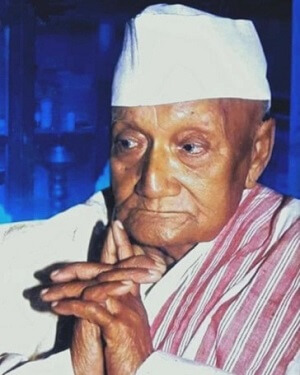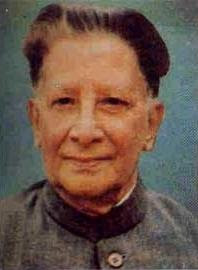Sonaram Chutia, fondly known as Vaishnav Pandit, holds an esteemed place in Assam’s history as a freedom fighter, social reformer, and scholar. Born on June 8, 1915, in Bamkukurachowa Gaon, Kakojan (present-day Jorhat district), his contributions to India’s independence, Assamese culture, and Vaishnavism remain unparalleled. His father was Jagiram Chutia, and his mother was Fuleswari Chutia.
Early Life and Education:
Sonaram started his schooling in Bamkukurachowa L.P. School in 1922. A brilliant student, he passed his matriculation in 1935 with distinction, excelling in subjects like Mathematics, Sanskrit, and Assamese. He graduated with a B.Sc. degree from Cotton College in 1939, securing distinction. However, his education was interrupted by the outbreak of World War II.
Freedom Fighter and Political Involvement:
In 1940, Sonaram joined the Jatiya Mahasabha (Indian National Congress) and actively participated in the Quit India Movement of 1942. His commitment to India’s independence led to his arrest by the British, and he was imprisoned in Jorhat Central Jail, where he met prominent Assamese freedom fighters like Gopinath Bordoloi and Fakhruddin Ali Ahmed. After spending two years and 18 days in jail, he was released on December 22, 1944, and later placed under house arrest for six months.
Association with Srimanta Sankardev Sangha:
In 1946, Sonaram joined the Palakhani Ashram in Nagaon on the birth anniversary of Srimanta Sankardev. This marked the beginning of his lifelong association with the Srimanta Sankardev Sangha, a Vaishnavite organization. From 1956 to 1978, he served as the president of the Sangha on nine occasions. After 1978, he became its chief advisor and dedicated his life to spreading Sankari culture and Mahapurushia Dharma.
Teaching Career:
Sonaram worked as a science teacher at various schools, including Sivasagar Govt. Higher Secondary School, Teok Balama High School, and Kakojan High School. In 1975, he retired as the headmaster of Teok Rajabari High School to focus entirely on his cultural and religious activities.
Literary Contributions:
Sonaram Chutia began his writing journey in 1939 after joining the Jatiya Mahasabha. His literary works were heavily influenced by Sankari culture and Vaishnavism, addressing spiritual, cultural, and social themes. Some of his notable books include:
- Naam Dharma Prakash (1954)
- Mahapurush Haridev Charit (1968)
- Axomor Vaisnav Darshanor Swarnarekha (1971)
- Bhagawat Mahatyama (1984)
- Ved Aaru Mahapusia Dharma (1988)
- Axomor Satra: Ek Anuhandhan (2003)
He wrote numerous articles for Assamese magazines, further enriching the state’s cultural legacy.
Honors and Awards:
- Honored as a freedom fighter by the Union Government in 1972.
- Received the Srimanta Sankardeva-Madhavdeva Award in 1994.
- Awarded the prestigious Srimanta Sankardeva Award by the Assam government in 2000.
- Conferred titles like Jorhat Ekalavya and Dalit Daradi by the North Eastern Research Organization in 2005.
Personal Life and Passing:
Sonaram Chutia passed away on January 30, 2013, at the age of 98 due to age-related ailments at the Jorhat Medical College Hospital. He left behind three sons, four daughters, and several grandchildren.
Legacy:
Sonaram Chutia’s life serves as an inspiration for students and scholars alike. His dedication to education, his contributions to India’s freedom movement, and his relentless efforts to promote Vaishnavism have left an indelible mark on Assam’s cultural and historical landscape.
What makes this narrative unique is the detailed emphasis on his multifaceted life—from his academic excellence and role as a teacher to his literary genius and commitment to cultural preservation. Such a holistic portrayal of his life ensures that students not only learn history but also draw motivation from his story.
FAQ’s:
Q 1. Who was Sonaram Chutia, and why is he known as Vaishnav Pandit?
Sonaram Chutia was a renowned freedom fighter, social reformer, scholar, and key figure in promoting Vaishnavism in Assam. His significant contributions to the Srimanta Sankardev Sangha earned him the title of “Vaishnav Pandit.”
Q 2. What were Sonaram Chutia’s contributions to India’s freedom movement?
Sonaram Chutia actively participated in the Quit India Movement in 1942, was arrested by the British, and spent over two years in Jorhat Central Jail for his role in the independence struggle.
Q 3. What is Sonaram Chutia’s association with Srimanta Sankardev Sangha?
He served as the president of the Srimanta Sankardev Sangha on nine occasions and later as its chief advisor, dedicating his life to promoting Sankari culture and Mahapurushia Dharma.
Q 4. What books did Sonaram Chutia write?
Sonaram Chutia wrote several influential books, including Naam Dharma Prakash, Mahapurush Haridev Charit, Axomor Vaisnav Darshanor Swarnarekha, and Ved Aaru Mahapusia Dharma. His works focused on Vaishnavism and Assamese culture.
Q 5. How did Sonaram Chutia contribute to Assamese literature and culture?
His writings, heavily influenced by Sankari culture, included books and articles that enriched Assamese literature and promoted Vaishnavism. His works are considered a treasure trove for understanding Assam’s spiritual and cultural heritage.
Q 6. What awards and honors did Sonaram Chutia receive?
He was honored as a freedom fighter by the Union Government in 1972, received the Srimanta Sankardeva-Madhavdeva Award in 1994, and was bestowed with the Srimanta Sankardeva Award by the Assam government in 2000, among other accolades.
Q 7. What role did Sonaram Chutia play as an educator?
Sonaram Chutia worked as a science teacher and later became the headmaster of Teok Rajabari High School. He retired in 1975 to dedicate his life to the Srimanta Sankardev Sangha and public service.
Q 8. When and where was Sonaram Chutia born?
Sonaram Chutia was born on June 8, 1915, in Bamkukurachowa Gaon, Kakojan, Jorhat district, Assam.
Q 9. What was Sonaram Chutia’s involvement in the Quit India Movement?
He played an active role in the movement, was arrested by British authorities, and was imprisoned for two years and 18 days in Jorhat Central Jail, where he interacted with prominent Assamese freedom fighters.
Q 10. What is Sonaram Chutia’s legacy in Assam?
Sonaram Chutia is remembered as a multifaceted personality—a freedom fighter, a scholar, an educator, and a promoter of Sankari culture. His lifelong dedication to Assam’s spiritual and cultural development continues to inspire future generations.











